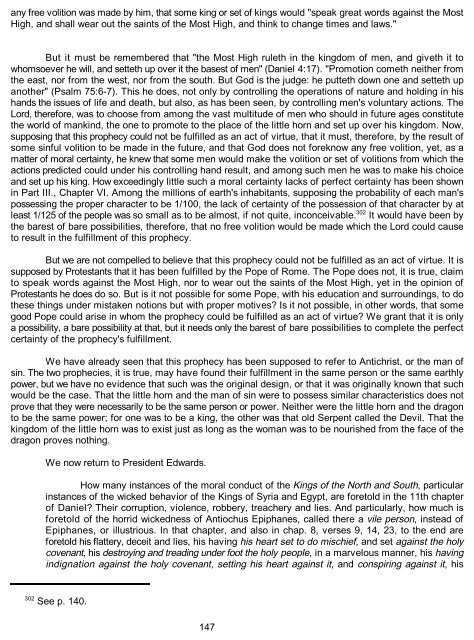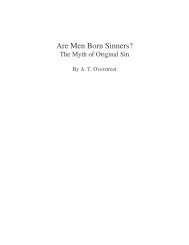Foreknowledge by Joel Hayes - Library of Theology
Foreknowledge by Joel Hayes - Library of Theology
Foreknowledge by Joel Hayes - Library of Theology
Create successful ePaper yourself
Turn your PDF publications into a flip-book with our unique Google optimized e-Paper software.
any free volition was made <strong>by</strong> him, that some king or set <strong>of</strong> kings would "speak great words against the Most<br />
High, and shall wear out the saints <strong>of</strong> the Most High, and think to change times and laws."<br />
But it must be remembered that "the Most High ruleth in the kingdom <strong>of</strong> men, and giveth it to<br />
whomsoever he will, and setteth up over it the basest <strong>of</strong> men" (Daniel 4:17). "Promotion cometh neither from<br />
the east, nor from the west, nor from the south. But God is the judge: he putteth down one and setteth up<br />
another" (Psalm 75:6-7). This he does, not only <strong>by</strong> controlling the operations <strong>of</strong> nature and holding in his<br />
hands the issues <strong>of</strong> life and death, but also, as has been seen, <strong>by</strong> controlling men's voluntary actions. The<br />
Lord, therefore, was to choose from among the vast multitude <strong>of</strong> men who should in future ages constitute<br />
the world <strong>of</strong> mankind, the one to promote to the place <strong>of</strong> the little horn and set up over his kingdom. Now,<br />
supposing that this prophecy could not be fulfilled as an act <strong>of</strong> virtue, that it must, therefore, <strong>by</strong> the result <strong>of</strong><br />
some sinful volition to be made in the future, and that God does not foreknow any free volition, yet, as a<br />
matter <strong>of</strong> moral certainty, he knew that some men would make the volition or set <strong>of</strong> volitions from which the<br />
actions predicted could under his controlling hand result, and among such men he was to make his choice<br />
and set up his king. How exceedingly little such a moral certainty lacks <strong>of</strong> perfect certainty has been shown<br />
in Part III., Chapter VI. Among the millions <strong>of</strong> earth's inhabitants, supposing the probability <strong>of</strong> each man's<br />
possessing the proper character to be 1/100, the lack <strong>of</strong> certainty <strong>of</strong> the possession <strong>of</strong> that character <strong>by</strong> at<br />
302<br />
least 1/125 <strong>of</strong> the people was so small as to be almost, if not quite, inconceivable. It would have been <strong>by</strong><br />
the barest <strong>of</strong> bare possibilities, therefore, that no free volition would be made which the Lord could cause<br />
to result in the fulfillment <strong>of</strong> this prophecy.<br />
But we are not compelled to believe that this prophecy could not be fulfilled as an act <strong>of</strong> virtue. It is<br />
supposed <strong>by</strong> Protestants that it has been fulfilled <strong>by</strong> the Pope <strong>of</strong> Rome. The Pope does not, it is true, claim<br />
to speak words against the Most High, nor to wear out the saints <strong>of</strong> the Most High, yet in the opinion <strong>of</strong><br />
Protestants he does do so. But is it not possible for some Pope, with his education and surroundings, to do<br />
these things under mistaken notions but with proper motives? Is it not possible, in other words, that some<br />
good Pope could arise in whom the prophecy could be fulfilled as an act <strong>of</strong> virtue? We grant that it is only<br />
a possibility, a bare possibility at that, but it needs only the barest <strong>of</strong> bare possibilities to complete the perfect<br />
certainty <strong>of</strong> the prophecy's fulfillment.<br />
We have already seen that this prophecy has been supposed to refer to Antichrist, or the man <strong>of</strong><br />
sin. The two prophecies, it is true, may have found their fulfillment in the same person or the same earthly<br />
power, but we have no evidence that such was the original design, or that it was originally known that such<br />
would be the case. That the little horn and the man <strong>of</strong> sin were to possess similar characteristics does not<br />
prove that they were necessarily to be the same person or power. Neither were the little horn and the dragon<br />
to be the same power; for one was to be a king, the other was that old Serpent called the Devil. That the<br />
kingdom <strong>of</strong> the little horn was to exist just as long as the woman was to be nourished from the face <strong>of</strong> the<br />
dragon proves nothing.<br />
We now return to President Edwards.<br />
How many instances <strong>of</strong> the moral conduct <strong>of</strong> the Kings <strong>of</strong> the North and South, particular<br />
instances <strong>of</strong> the wicked behavior <strong>of</strong> the Kings <strong>of</strong> Syria and Egypt, are foretold in the 11th chapter<br />
<strong>of</strong> Daniel? Their corruption, violence, robbery, treachery and lies. And particularly, how much is<br />
foretold <strong>of</strong> the horrid wickedness <strong>of</strong> Antiochus Epiphanes, called there a vile person, instead <strong>of</strong><br />
Epiphanes, or illustrious. In that chapter, and also in chap. 8, verses 9, 14, 23, to the end are<br />
foretold his flattery, deceit and lies, his having his heart set to do mischief, and set against the holy<br />
covenant, his destroying and treading under foot the holy people, in a marvelous manner, his having<br />
indignation against the holy covenant, setting his heart against it, and conspiring against it, his<br />
302<br />
See p. 140.<br />
147






